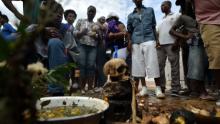
Photos: Halloween and other fall festivities around the world
Vodou devotees participate in ceremonies on the Day of the Dead in Port-au-Prince, Haiti, on November 2, 2017.
Hide Caption
4 of 7
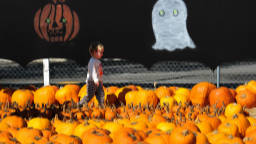
Photos: Halloween and other fall festivities around the world
A young child walks across a pumpkin patch in Culver City in southern California, ahead of Halloween. In the US, Halloween is celebrated with child-friendly activities, like trick-or-treating, carving pumpkins into jack-o'-lanterns and dressing in costumes.
Hide Caption
5 of 7
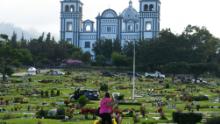
Photos: Halloween and other fall festivities around the world
A woman takes flowers to the grave of a relative during the Day of the Dead at a cemetery in Tegucigalpa, Honduras, on November 2, 2017.
Hide Caption
6 of 7
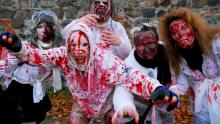
Photos: Halloween and other fall festivities around the world
People dress up as zombies as part of the annual Zombie Walk in Berlin, Germany, on October 26, 2013. This walk traditionally occurs the last weekend before Halloween.
Hide Caption
7 of 7
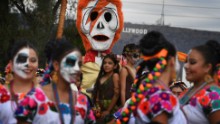
Photos: Halloween and other fall festivities around the world
People in costume gather for the annual Dia de los Muertos, or Day of the Dead, festival at the Hollywood Forever cemetery in Hollywood, California, on October 29, 2016. Dia de los Muertos is a festival to remember friends and family members who have died and originated in Mexico.
Hide Caption
1 of 7
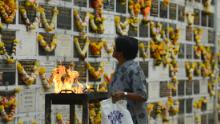
Photos: Halloween and other fall festivities around the world
A woman prays near a plaque commemorating relatives on All Souls Day at a cemetery in Mumbai, India, on November 2, 2017. All Souls Day is observed in remembrance of friends and loved ones who passed away.
Hide Caption
2 of 7
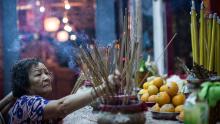
Photos: Halloween and other fall festivities around the world
A woman makes offerings at a park during the month of the Hungry Ghost Festival on August 14, 2015 in Hong Kong. One of the main activities of the Chinese festival includes paying respects with food offerings to hungry ghosts.
Hide Caption
3 of 7

Photos: Halloween and other fall festivities around the world
Vodou devotees participate in ceremonies on the Day of the Dead in Port-au-Prince, Haiti, on November 2, 2017.
Hide Caption
4 of 7

Photos: Halloween and other fall festivities around the world
A young child walks across a pumpkin patch in Culver City in southern California, ahead of Halloween. In the US, Halloween is celebrated with child-friendly activities, like trick-or-treating, carving pumpkins into jack-o'-lanterns and dressing in costumes.
Hide Caption
5 of 7

Photos: Halloween and other fall festivities around the world
A woman takes flowers to the grave of a relative during the Day of the Dead at a cemetery in Tegucigalpa, Honduras, on November 2, 2017.
Hide Caption
6 of 7

Photos: Halloween and other fall festivities around the world
People dress up as zombies as part of the annual Zombie Walk in Berlin, Germany, on October 26, 2013. This walk traditionally occurs the last weekend before Halloween.
Hide Caption
7 of 7

Photos: Halloween and other fall festivities around the world
People in costume gather for the annual Dia de los Muertos, or Day of the Dead, festival at the Hollywood Forever cemetery in Hollywood, California, on October 29, 2016. Dia de los Muertos is a festival to remember friends and family members who have died and originated in Mexico.
Hide Caption
1 of 7

Photos: Halloween and other fall festivities around the world
A woman prays near a plaque commemorating relatives on All Souls Day at a cemetery in Mumbai, India, on November 2, 2017. All Souls Day is observed in remembrance of friends and loved ones who passed away.
Hide Caption
2 of 7

Photos: Halloween and other fall festivities around the world
A woman makes offerings at a park during the month of the Hungry Ghost Festival on August 14, 2015 in Hong Kong. One of the main activities of the Chinese festival includes paying respects with food offerings to hungry ghosts.
Hide Caption
3 of 7

Photos: Halloween and other fall festivities around the world
Vodou devotees participate in ceremonies on the Day of the Dead in Port-au-Prince, Haiti, on November 2, 2017.
Hide Caption
4 of 7







Story highlights
- Celebrations around the same time as Halloween include Día de Muertos, the Hungry Ghost Festival, All Saints' Day
- In France, "people may go to cemeteries and they wear a flower to honor their departed"
- In Guatemala, colorful kites are flown to honor the dead
(CNN)In the United States, it's that time of year when children dress in costume and parade the neighborhood, asking for sugary treats. Families may share scary stories around a bonfire, or curl up with popcorn to watch horror movies.
Halloween is upon us, with more than 175 million Americans planning to partake in festivities this year, according to the National Retail Federation.
Yet in other countries around the world, there are some very different celebrations that occur during the last week of October or first days of November.

Parenting Without Borders considers how parenting trends and methods differ -- or don't -- around the world.
"Halloween is pretty much a North American holiday, as we celebrate it now," said Regina Hansen, a master lecturer at Boston University's College of General Studies, who has expertise in Halloween-related practices throughout history and popular culture.
"There are countries that have All Saints' celebrations or Day of the Dead or All Souls Day type of celebrations that are not Halloween," she said. "They are different things that happen to occur at the same time."
As American children delight in Halloween celebrations, here is just a sampling of some other fall festivities that families may be engaging in around the world.
Remembering ancestors and lives lost
"The mid-point between summer, in a general sense, and winter is a time traditionally associated with the remembrance of the dead in many cultures," said Joseph Nagy, a professor in Harvard University's Department of Celtic Languages and Literature in Boston, who has expertise in folklore and mythology.
Around the same time as Halloween, some families in Mexico gather to remember deceased friends and family members for a holiday known as el Día de los Muertos, or Day of the Dead, on November 2nd. Celebrations typically begin two days before.
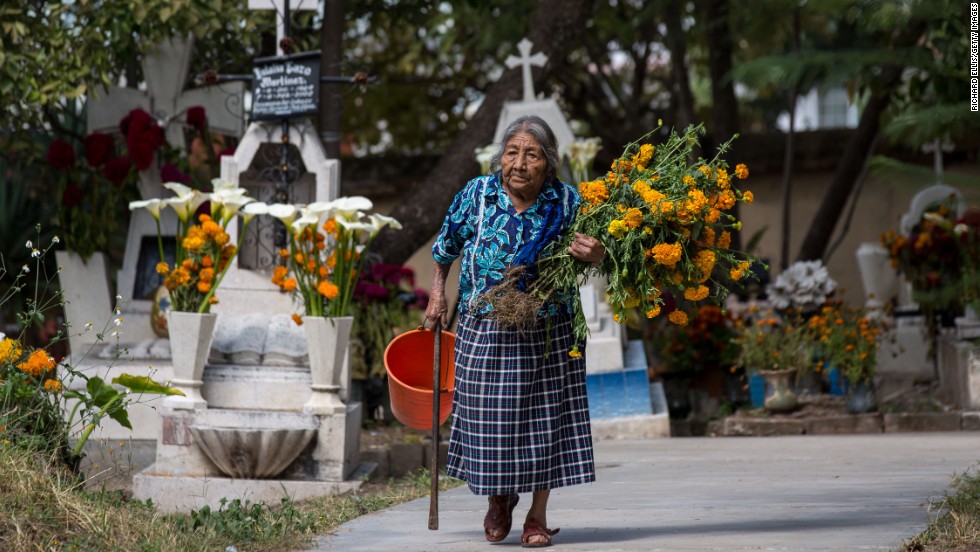
Photos: Photos: Dia de los Muertos
Dia de los Muertos: Celebrating lives lost – An elderly Zapotec indigenous woman carries flowers to the grave of a family member at the start of the Day of the Dead festival in Teotitlan, Mexico. "Marigold flowers are used for Day of the Dead because of their pungent smell. It's supposed to attract the spirits back on this one day they are allowed to return to visit family and friend," says Anaya-Cerda.
Hide Caption
6 of 10

Photos: Photos: Dia de los Muertos
Dia de los Muertos: Celebrating lives lost – "Over the years, skull face painting has become very popular. It symbolizes the acceptance of death, of the cycle of life," says Cano-Murillo. "When the spirits crossover, you are sending a message that you are celebrating it with them. You are not in fear of death."
Hide Caption
7 of 10
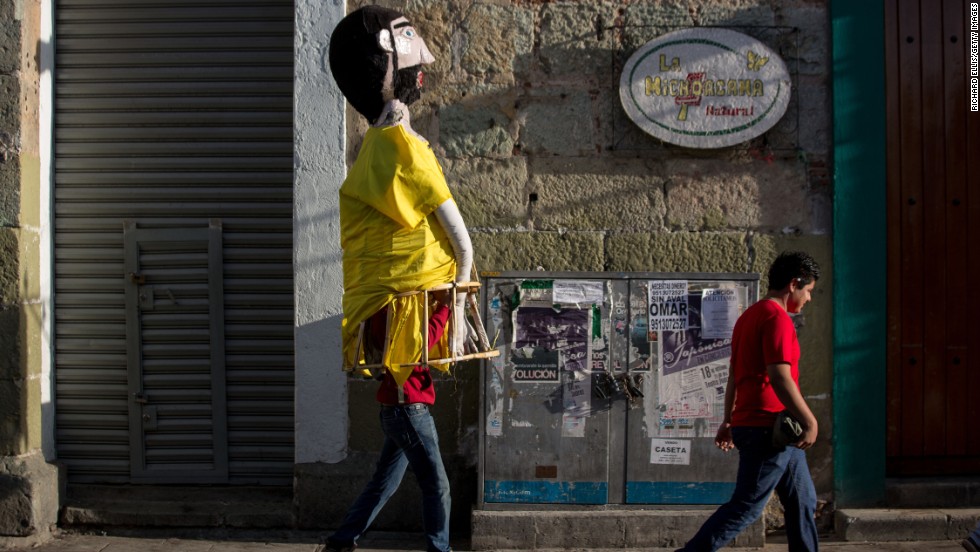
Photos: Photos: Dia de los Muertos
Dia de los Muertos: Celebrating lives lost – A paper mache costumed character walks through the streets of Oaxaca. "At first, children a bit scared of the costumes and skull painting because they don't know what it means," says Valentin Concha-Nunez, museum educator for El Museo del Barrio in New York. "But when I tell them to touch their craniums they realize that skulls are a part of them and then they embrace that aspect of it."
Hide Caption
8 of 10
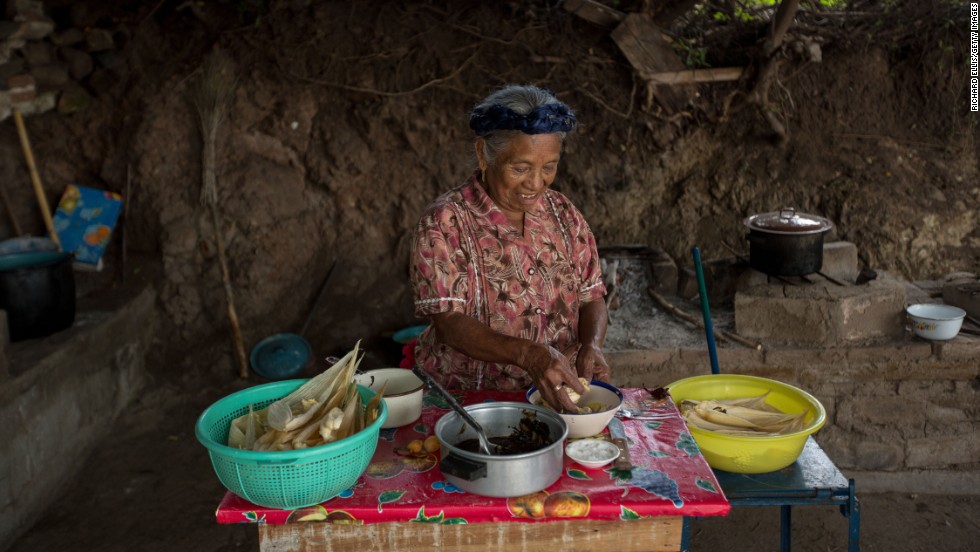
Photos: Photos: Dia de los Muertos
Dia de los Muertos: Celebrating lives lost – An elderly woman hand makes traditional tamales for the Day of the Dead festival. "This is one of my favorite aspects of Dia de los Muertos because my father, who recently passed away, wasn't too keen on skulls. Making tamales, bread and other favorite foods that their loved ones would have enjoyed is an important aspect of this celebration," says Cano-Murillo, "Eventually, we are all going to take our turn so wouldn't it be nice if your family and friends took a day out to remember you."
Hide Caption
9 of 10
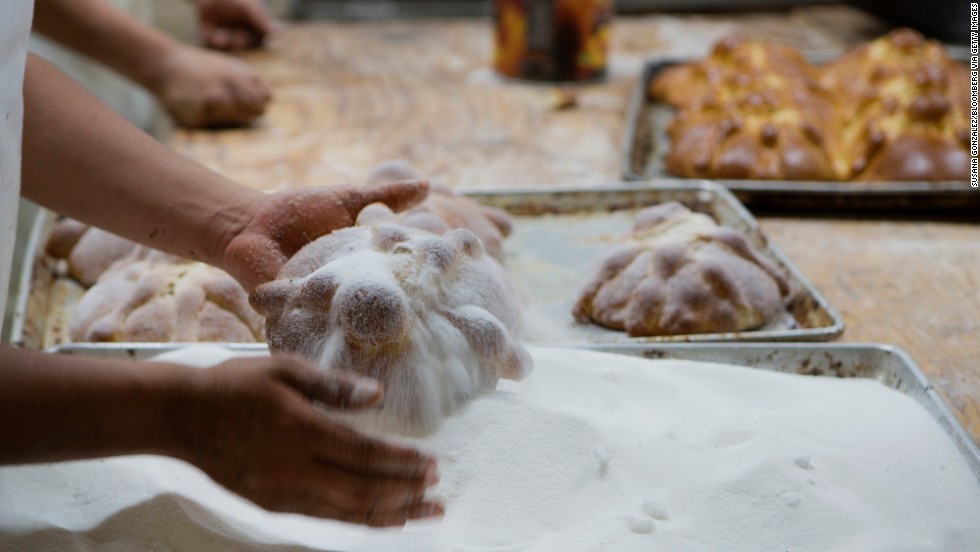
Photos: Photos: Dia de los Muertos
Dia de los Muertos: Celebrating lives lost – A baker adds sugar to loaves of pan de muerto at La Ideal bakery in Mexico City on Thursday, October 24. The pan de muerto, or bread of the dead, is a sweet soft bread shaped like a bun often decorated with bone-like pieces traditionally baked in Mexico during the weeks leading up to Dia de los Muertos.
Hide Caption
10 of 10

Photos: Photos: Dia de los Muertos
Dia de los Muertos: Celebrating lives lost – A Mexican woman wipes away a tear as a Mariachi band plays at the tomb of a loved one during the Dia de los Muertos, or Day of the Dead, festival in Oaxaca, Mexico, on Thursday, October 31. Celebrated in Mexico and around the world, the traditional holiday honors the lives of lost family members and friends.
Hide Caption
1 of 10
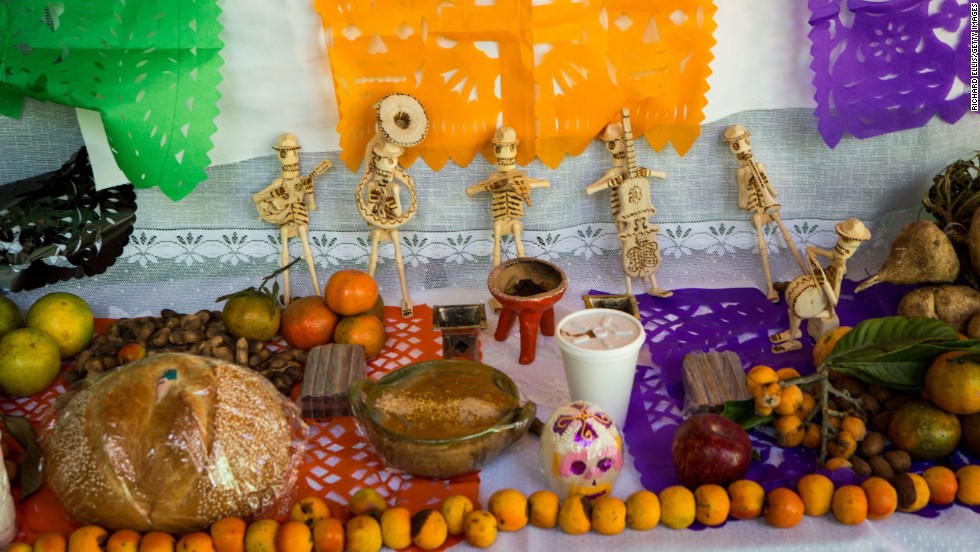
Photos: Photos: Dia de los Muertos
Dia de los Muertos: Celebrating lives lost – "People build altars to let their loved ones know they were missed, candles are lit to help guide them back to their home and some of their favorite items are set out to make them feel welcomed. I've made an altar in honor of my grandmother, setting out her favorite perfume," says Aurora Anaya-Cerda, owner of La Casa Azul bookstore.
Hide Caption
2 of 10

Photos: Photos: Dia de los Muertos
Dia de los Muertos: Celebrating lives lost – "Some choose to go to the grave site of the loved one instead of building an altar," says Mexican-American writer Kathy Cano-Murillo, owner of Crafty Chica in Phoenix, Arizona. "Family and friends bring candles which are turned off to symbolize the end of their journey to our world."
Hide Caption
3 of 10

Photos: Photos: Dia de los Muertos
Dia de los Muertos: Celebrating lives lost – Revelers dance through the streets in traditional costumes in Oaxaca on Wednesday, October 30. "The first day of Dia de los Muertos is dedicated to honoring the lives of children who have passed away and adults are celebrated the next day," says Cano-Murillo.
Hide Caption
4 of 10

Photos: Photos: Dia de los Muertos
Dia de los Muertos: Celebrating lives lost – "While children often dress in costumes and participate in parades for Halloween, it's completely independent of Day of the Dead," says Juan Carlos Aguirre, executive director of Mano a Mano, a New York-based nonprofit organization dedicated to celebrating Mexican culture and promoting the understanding of Mexican traditions through arts and culture.
Hide Caption
5 of 10

Photos: Photos: Dia de los Muertos
Dia de los Muertos: Celebrating lives lost – An elderly Zapotec indigenous woman carries flowers to the grave of a family member at the start of the Day of the Dead festival in Teotitlan, Mexico. "Marigold flowers are used for Day of the Dead because of their pungent smell. It's supposed to attract the spirits back on this one day they are allowed to return to visit family and friend," says Anaya-Cerda.
Hide Caption
6 of 10

Photos: Photos: Dia de los Muertos
Dia de los Muertos: Celebrating lives lost – "Over the years, skull face painting has become very popular. It symbolizes the acceptance of death, of the cycle of life," says Cano-Murillo. "When the spirits crossover, you are sending a message that you are celebrating it with them. You are not in fear of death."
Hide Caption
7 of 10

Photos: Photos: Dia de los Muertos
Dia de los Muertos: Celebrating lives lost – A paper mache costumed character walks through the streets of Oaxaca. "At first, children a bit scared of the costumes and skull painting because they don't know what it means," says Valentin Concha-Nunez, museum educator for El Museo del Barrio in New York. "But when I tell them to touch their craniums they realize that skulls are a part of them and then they embrace that aspect of it."
Hide Caption
8 of 10

Photos: Photos: Dia de los Muertos
Dia de los Muertos: Celebrating lives lost – An elderly woman hand makes traditional tamales for the Day of the Dead festival. "This is one of my favorite aspects of Dia de los Muertos because my father, who recently passed away, wasn't too keen on skulls. Making tamales, bread and other favorite foods that their loved ones would have enjoyed is an important aspect of this celebration," says Cano-Murillo, "Eventually, we are all going to take our turn so wouldn't it be nice if your family and friends took a day out to remember you."
Hide Caption
9 of 10

Photos: Photos: Dia de los Muertos
Dia de los Muertos: Celebrating lives lost – A baker adds sugar to loaves of pan de muerto at La Ideal bakery in Mexico City on Thursday, October 24. The pan de muerto, or bread of the dead, is a sweet soft bread shaped like a bun often decorated with bone-like pieces traditionally baked in Mexico during the weeks leading up to Dia de los Muertos.
Hide Caption
10 of 10

Photos: Photos: Dia de los Muertos
Dia de los Muertos: Celebrating lives lost – A Mexican woman wipes away a tear as a Mariachi band plays at the tomb of a loved one during the Dia de los Muertos, or Day of the Dead, festival in Oaxaca, Mexico, on Thursday, October 31. Celebrated in Mexico and around the world, the traditional holiday honors the lives of lost family members and friends.
Hide Caption
1 of 10

Photos: Photos: Dia de los Muertos
Dia de los Muertos: Celebrating lives lost – "People build altars to let their loved ones know they were missed, candles are lit to help guide them back to their home and some of their favorite items are set out to make them feel welcomed. I've made an altar in honor of my grandmother, setting out her favorite perfume," says Aurora Anaya-Cerda, owner of La Casa Azul bookstore.
Hide Caption
2 of 10

Photos: Photos: Dia de los Muertos
Dia de los Muertos: Celebrating lives lost – "Some choose to go to the grave site of the loved one instead of building an altar," says Mexican-American writer Kathy Cano-Murillo, owner of Crafty Chica in Phoenix, Arizona. "Family and friends bring candles which are turned off to symbolize the end of their journey to our world."
Hide Caption
3 of 10

Photos: Photos: Dia de los Muertos
Dia de los Muertos: Celebrating lives lost – Revelers dance through the streets in traditional costumes in Oaxaca on Wednesday, October 30. "The first day of Dia de los Muertos is dedicated to honoring the lives of children who have passed away and adults are celebrated the next day," says Cano-Murillo.
Hide Caption
4 of 10

Photos: Photos: Dia de los Muertos
Dia de los Muertos: Celebrating lives lost – "While children often dress in costumes and participate in parades for Halloween, it's completely independent of Day of the Dead," says Juan Carlos Aguirre, executive director of Mano a Mano, a New York-based nonprofit organization dedicated to celebrating Mexican culture and promoting the understanding of Mexican traditions through arts and culture.
Hide Caption
5 of 10










In Haiti, Day of the Dead is sometimes celebrated with various Vodou rituals and customs.
Meanwhile, some families in Nigeria celebrate the Odo masquerade festival, which is a somewhat similar honoring of the dead, during which festival participants wear masks and perform theatrical acts.
Before Halloween, typically in August, some families in China celebrate the Hungry Ghost Festival, a month-long ancient tradition that pays respect to the spirits of the dead on the seventh month of the lunar calendar.
During the festival, ghosts are believed to return to Earth to haunt the living and people burn paper money, food and incense to pay respect to their ancestors and soothe wandering spirits. Throughout the month, many communities host celebrations, hand out rice to people in need and stage traditional Chinese operas on temporary bamboo stages.

Photos: Dracula's Castle
Former fortress – Construction on the castle was completed in 1388. Standing at the Eastern border of Transylvania, it was once used as a fortress to block the Ottoman Empire's expansion.
Hide Caption
4 of 7

Photos: Dracula's Castle
The armor collection – The castle also features displays of the armor and weapons used throughout the region's history.
Hide Caption
5 of 7
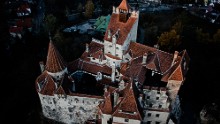
Photos: Dracula's Castle
Aerial view – Stoker's Dracula is based on the 15th-century ruler, Vlad the Impaler, who ordered the brutal torture and death of tens of thousands of people during his reign. Though he did attack the village of Brasov, historians say he never actually lived in the castle.
Hide Caption
6 of 7

Photos: Dracula's Castle
Local souvenirs – Drinking coffee out of one of these Dracula mugs -- on sale at a Bran Castle souvenir shop -- is sure to wake anyone up in the morning.
Hide Caption
7 of 7
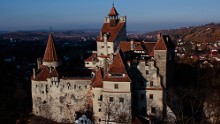
Photos: Dracula's Castle
Bran Castle – Located just outside the Romanian city of Brasov, Bran Castle was made famous by Irish author Bram Stoker's novel "Dracula," published in 1897.
Hide Caption
1 of 7
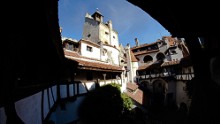
Photos: Dracula's Castle
Dracula's Castle – Stoker never actually visited Bran Castle. But because it's the only castle in all of Transylvania that actually fits Stoker's description of the famed vampire's home, it's known throughout the world as Dracula's Castle, say local tourism officials.
Hide Caption
2 of 7
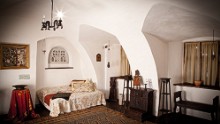
Photos: Dracula's Castle
Inside the castle – Visitors to Bran Castle can join a tour or explore some of its former occupants' rooms on their own, including King Ferdinand's dining room, the music room and Queen Marie's bedroom.
Hide Caption
3 of 7

Photos: Dracula's Castle
Former fortress – Construction on the castle was completed in 1388. Standing at the Eastern border of Transylvania, it was once used as a fortress to block the Ottoman Empire's expansion.
Hide Caption
4 of 7

Photos: Dracula's Castle
The armor collection – The castle also features displays of the armor and weapons used throughout the region's history.
Hide Caption
5 of 7

Photos: Dracula's Castle
Aerial view – Stoker's Dracula is based on the 15th-century ruler, Vlad the Impaler, who ordered the brutal torture and death of tens of thousands of people during his reign. Though he did attack the village of Brasov, historians say he never actually lived in the castle.
Hide Caption
6 of 7

Photos: Dracula's Castle
Local souvenirs – Drinking coffee out of one of these Dracula mugs -- on sale at a Bran Castle souvenir shop -- is sure to wake anyone up in the morning.
Hide Caption
7 of 7

Photos: Dracula's Castle
Bran Castle – Located just outside the Romanian city of Brasov, Bran Castle was made famous by Irish author Bram Stoker's novel "Dracula," published in 1897.
Hide Caption
1 of 7

Photos: Dracula's Castle
Dracula's Castle – Stoker never actually visited Bran Castle. But because it's the only castle in all of Transylvania that actually fits Stoker's description of the famed vampire's home, it's known throughout the world as Dracula's Castle, say local tourism officials.
Hide Caption
2 of 7

Photos: Dracula's Castle
Inside the castle – Visitors to Bran Castle can join a tour or explore some of its former occupants' rooms on their own, including King Ferdinand's dining room, the music room and Queen Marie's bedroom.
Hide Caption
3 of 7

Photos: Dracula's Castle
Former fortress – Construction on the castle was completed in 1388. Standing at the Eastern border of Transylvania, it was once used as a fortress to block the Ottoman Empire's expansion.
Hide Caption
4 of 7







In some countries, certain American Halloween traditions have emerged, among children and adults alike. For instance, some adults travel to spooky places like Transylvania around Halloween.
Located just outside of the Romanian city of Brasov, Bran Castle -- made famous by Irish author Bram Stoker as Dracula's Castle -- tends to host Halloween celebrations of its own.
Meanwhile, in Japan, Halloween has become an event for adults to enjoy with cosplay and parties.
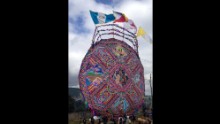
Photos: Giant Kites to honor the dead in Guatemala
The tradition goes back to the pre-Colombian era, before the appearance of European influences on the American continent. It has evolved through time to incorporate Christian religious traditions, and was declared part of Guatemala's cultural heritage in 1999.
Hide Caption
4 of 6
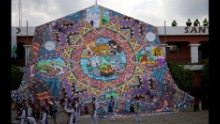
Photos: Giant Kites to honor the dead in Guatemala
The giant kites often contain messages aimed at inspiring the living to be friendly to each other and work towards peace. The motifs drawn on the giant kites are not a way of communicating with departed souls, but a way for the people of Sacatepequez to express themselves artistically.
Hide Caption
5 of 6
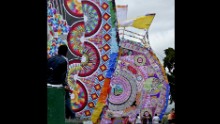
Photos: Giant Kites to honor the dead in Guatemala
The main objective of the cultural and religious tradition is to honor the dearly departed in a spectacle of color and allow the younger generations to express their art by painting the giant kites.
Hide Caption
6 of 6
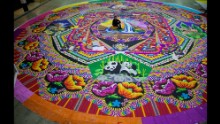
Photos: Giant Kites to honor the dead in Guatemala
Giant kites festival by Rolando Estrada – The Barriletes Gigantes festival is celebrated every year on the first and second of November in Guatemala.
Hide Caption
1 of 6
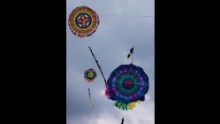
Photos: Giant Kites to honor the dead in Guatemala
The Barriletes Gigantes festival is one of the region's main cultural events. On All Saints' Day, the people of Sacatepequez fly the giant kites, painted by hand, over the graves of their family members while they pray and deposit flowers.
Hide Caption
2 of 6
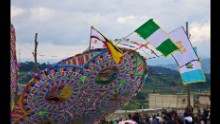
Photos: Giant Kites to honor the dead in Guatemala
One of the greatest challenges is keeping the kites in the air, due to their weight and size. The largest kites have a diameter of 15 meters. Young men and children join together in teams to launch the kites and compete amicably with each other as everyone wants to keep their kite flying for as long as possible.
Hide Caption
3 of 6

Photos: Giant Kites to honor the dead in Guatemala
The tradition goes back to the pre-Colombian era, before the appearance of European influences on the American continent. It has evolved through time to incorporate Christian religious traditions, and was declared part of Guatemala's cultural heritage in 1999.
Hide Caption
4 of 6

Photos: Giant Kites to honor the dead in Guatemala
The giant kites often contain messages aimed at inspiring the living to be friendly to each other and work towards peace. The motifs drawn on the giant kites are not a way of communicating with departed souls, but a way for the people of Sacatepequez to express themselves artistically.
Hide Caption
5 of 6

Photos: Giant Kites to honor the dead in Guatemala
The main objective of the cultural and religious tradition is to honor the dearly departed in a spectacle of color and allow the younger generations to express their art by painting the giant kites.
Hide Caption
6 of 6

Photos: Giant Kites to honor the dead in Guatemala
Giant kites festival by Rolando Estrada – The Barriletes Gigantes festival is celebrated every year on the first and second of November in Guatemala.
Hide Caption
1 of 6

Photos: Giant Kites to honor the dead in Guatemala
The Barriletes Gigantes festival is one of the region's main cultural events. On All Saints' Day, the people of Sacatepequez fly the giant kites, painted by hand, over the graves of their family members while they pray and deposit flowers.
Hide Caption
2 of 6

Photos: Giant Kites to honor the dead in Guatemala
One of the greatest challenges is keeping the kites in the air, due to their weight and size. The largest kites have a diameter of 15 meters. Young men and children join together in teams to launch the kites and compete amicably with each other as everyone wants to keep their kite flying for as long as possible.
Hide Caption
3 of 6






On the first day of November, some families worldwide, from France to Guatemala, celebrate All Saints' Day, a Christian festival typically marked with family gatherings and silent prayers to honor all of the saints.
Pope Gregory III built and dedicated a special chapel in Rome in the 8th century in memory of all the saints on November 1, according to the Catholic University of America. Then Pope Gregory IV and Emperor Louis the Pious extended the November 1 feast of All Saints to the Holy Roman Empire in the 9th century, and from there it spread throughout Europe.
In medieval England, the festival was known as All Hallows, and its eve is All Hallows' Eve, or Halloween. The day after All Saints' Day is All Souls' Day on November 2. These days were designated as a celebration of saints and a time to pray for dead souls.
During this time in France, for instance, "people may go to cemeteries and they wear a flower to honor their departed relatives," Hansen said, referring to chrysanthemums.
Meanwhile, in Guatemala, some families honor their dead by flying large, colorful, hand-painted kites in the sky over the graves of family members.
As it turns out, even where the idea of Halloween is believed to have originated -- in western Europe -- some celebrations involved honoring the dead.
Halloween's spooky origins
"Probably the first thing we have that is related to Halloween is this Irish Celtic festival known as Samhain, which occurred at the end of October and this is often thought of as a new year celebration," Hansen said.
The word Halloween is an abbreviated version of the phrases All Hallows' Eve or All Hallows' Evening, but the celebration is believed to have come from that ancient festival celebrated by Celtic people more than 2,000 years ago.
"What we would call November, or the early part of it, appears to have been the designated end-of-harvest and beginning-of-winter time among peoples who spoke or speak Celtic languages -- primarily represented today by the Irish, the Scottish particularly of the Highlands and islands, the Welsh, and the Bretons -- but the Celtic languages were far more widespread throughout Europe in ancient times," Nagy said.
"In Irish, this time or, specifically, what we would call November 1, is known as Samhain, which probably means 'end of summer,' " he said. "This time was, and still to some extent is, treated in the traditional cultures of Ireland, Scotland, Wales and Brittany as 'liminal' -- that is, a time when boundaries both human and metaphysical loosen up."
While it remains unclear exactly how ancient Celtic people celebrated Samhain, due to there not being many written records, Hansen had some ideas.
Get CNN Health's weekly newsletter
Sign up here to get The Results Are In with Dr. Sanjay Gupta every Tuesday from the CNN Health team.
"They probably had bonfires ... and made offerings of food and crops and cattle," Hansen said, since research suggests that is typically how they tended to celebrate things.
"It was when the Irish immigrants came that the holiday really sort of took root in America and they had their practice of going door to door, asking for fruits and nuts and things like that," she said, referring to how immigrants from Ireland and Scotland brought Halloween-like traditions to the US in the 1800s.
Then over time, she added, Halloween became more commercialized and evolved into the candy-fueled celebration it is today, not only in the US but other countries too.
All in all, "there are lots of ways to celebrate Halloween and for many people it's still a religious holiday or has religious implications, and for other people it's entirely secular," Hansen said.
"Some people will watch Halloween movies. Some people have trick-or-treats or partying," she said. "There's so many ways to celebrate it and it seems to me to be able to adapt itself to whatever interests you."
CNN's Stella Ko and Georgia McCafferty contributed to this report.
- Get link
- X
- Other Apps
- Get link
- X
- Other Apps
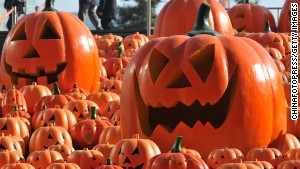
Comments
Post a Comment